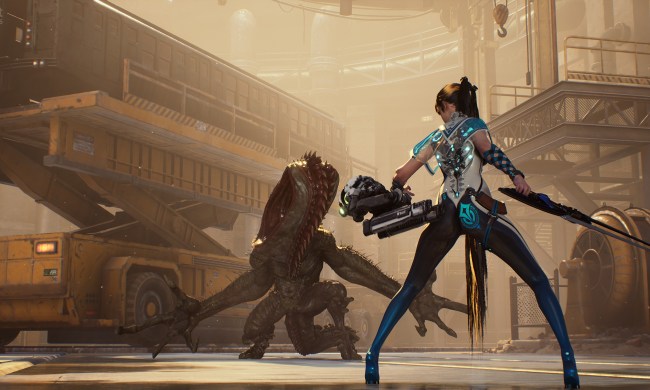You can’t have an awards show without a little drama. While institutions like the Oscars can shine a celebratory spotlight on artists and their craft, they also tend to bring out the peanut gallery. Everything from nominations to production choices gets skewered as viewers debate the right way to recognize the art they love. That attitude has spilled into video games in recent years, as shows like The Game Awards have opened conversations about how the medium is celebrated, whether or not enough games are getting the shine they deserve, and who should be the arbiter of those decisions. Those discussions have left some hungry for a fresh approach to the standard awards format, one that better represents the way they view video games.
Content creator Kahlief Adams saw a similar need when looking at the current awards landscape. Best known as the host of Spawn On Me, a popular gaming podcast that focuses on lifting up people of color in the gaming industry, Adams began to see how his overall mission naturally dovetailed with the idea of an awards show. With the right approach, an awards show could give him another platform to spotlight underrepresented voices while celebrating a diverse array of games released every year.
Thus, The Spawnies were born.
Now in its second year, the independent awards broadcast looks to fill in some of the gaps present in the gaming scene. Speaking to Digital Trends ahead of this year’s show, which broadcasts live on January 30, Adams explained his grand vision for The Spawnies and what sets it apart from established ceremonies with much bigger budgets. For him, the show feeds an appetite for nuance and diversity that the industry struggles to deliver … and it does so with the enthusiasm of a good party.
‘It has to be a party’
Before The Spawnies began in 2022, Adams was just as much an observer as anyone who tunes into shows like the Game Awards. Though his feelings on Keighley’s grand ceremony come from a place of respect, he began to see holes in its approach that he felt uniquely qualified to address.
“You look at the landscape of the video game award show space, and it feels really interesting and cool, but one of the biggest conversations you hear is that the developers don’t have a lot of time to talk about their craft,” Adams tells Digital Trends. “That was a main driving point that coincides with the main overarching one around Spawn On Me, our podcast. How do we do that, especially for developers from underrepresented cultures and spaces? I was like, this would be a really cool event to mash up those two ideas.”
I want it to feel like TRL did in the MTV days.
The Spawnies was created as both a response to other awards shows and as an extension of his own work. In its maiden voyage, Adams, alongside co-host Riana Manuel-Peña, would craft a small-scale ceremony that delivered the usual award show staples seen through the lens of a Twitch live stream. It featured guest presenters, acceptance speeches from developers, and musical performances like any other show — all while an enthusiastic live chat followed along.
What sets The Spawnies apart, though, is its style and attitude. Rather than trying to replicate the suit and tie (or blazer and graphic tee) vibe of the Game Awards, the show would embrace a playful tone. Adams would hand out honors like “Snot Bubble Cry Award” and “The Jamiroquai,” which would celebrate VR games. Nominees wouldn’t relieve a statue of a gold man, but rather an “award” modeled after a Red Lobster cheddar biscuit.
For Adams, that light-hearted tone isn’t an irreverent gimmick that takes away from the prestige of the ceremony. Rather, it allows viewers to see gaming through a specific cultural lens that isn’t represented at more tightly wound awards shows.
“I want our show to be taken seriously, but also I want folks to not feel like they have to be the most buttoned up and have a pinky in the air when you’re thinking about this really fun pastime,” he says. “There’s a lot of fun to be had that speaks towards the cultural spaces that hip-hop brings to it and Black and brown culture as well.”
This year’s show will build on that format, uniting its hosts in person, but Adams has a grander vision for how it can evolve with more resources (“We’re not playing with Keighley-sized money; we’re playing with 9-5 Kahlief money!”). In an ideal world, Adams would love to put on a live proper stag show filled with world premieres. However it evolves, though, the key is making sure that it doesn’t lose the energetic spirit that makes up the heart of the show.
“It has to be a party,” Adams says. “It can’t just be stodginess in seats. I want it to be something that’s more flavorful, where we can celebrate games and do a full live stage show. This is going to date me, but I want it to feel like TRL did in the MTV days. Everybody roll up into a good spot, have good vibes, hang out. We talk a little bit about the gaming stuff, we do history telling about our contributions to the industry.”
A more diverse awards show
A big change about 2023’s show is that Adams’ audience got a chance to vote on this year’s nominees thanks to a partnership with GrabLabs. Aided by thousands of votes from his community, this year’s Spawnies features an incredibly wide range of games that don’t look anything like the nominees at the 2022 Game Awards or the New York Video Games Critics Circle. Indies like Signalis, I Was a Teenage Exocolonist, and more are competing in major categories alongside heavy hitters like Horizon Forbidden West. Adams feels that the surprising field directly correlates to his diverse audience.

“It’s a full reflection of our audience,” Adams says. “A lot of the folks who voted in this year’s Spawnies were part of our Spawn On Me podcast audience and other folks who know me and the work I’ve done over the years in the industry. Hopefully, it’s not just a reflection of the nuance I bring to the space, but also, it’s a huge hat tip to our audience for being so diverse. Not only in ethnicity, gender, and race but in the ways that they think about games.”
A lot of discussion goes into what gets nominated for awards, but less goes into who actually decides those nominations. The Oscars experienced a reckoning in 2015 when all 20 of its acting nominations went to white actors for the second year in a row. An #OscarsSoWhite hashtag spurred change within the institution, pushing the Oscars to diversify its jury. The show has seen significant change since then — this year’s show includes four nominations for Asian actors, which is a record.
Though the games award circuit hasn’t come under similar scrutiny yet, but Adams sees the importance of that standard. It’s not just about determining what artists get celebrated, but how a broadcast can authentically reach a wider culture.
“It’s huge not only from who gets nominated and what games make it into your show, but the formatting of your show is hugely directional based on who the folks at the top having those conversations,” Adams says. “What do you think is cool? What do you think is on top of people’s minds? What are the cultural relevancies you want to hit? For our show, it’s hosted by two Black individuals. I’m running 99% of how the show looks and feels … From the time we go live until the end of that broadcast, the aspirational goal is that every person you see is a person of color or from an underrepresented group.”
I don’t want this space to be left without an understanding of the things we have brought to it.
That goal extends the work Adams has long aimed to achieve with Spawn On Me and his wider platform as a content creator. Representation has always been at the forefront of his work, as he seeks to lift up people of color whose contributions to the industry can often be overlooked. In addition to celebrating the year’s best games, one of The Spawnies’ ultimate missions is to pass on some institutional knowledge to its viewers, painting a more complete picture of gaming’s past, present, and future.
“Every year you get a different layer of how we as a people are contributing to an industry that has always left us out of the equation except for conversations about Jerry Lawson that pop up every year around Black History Month,” Adams says. “I think it’s important for us to showcase and be the arbiters of those conversations, and say here is the history of some of the people who made this industry great while giving a space to tell you about the people who are working every day to bring you experiences and fun who look exactly like you or come from backgrounds that you come from.”
Though that mission may sound agreeable enough, it can present challenges in the gaming world. Online spaces centered around games can be a hotbed for racism and that’s especially true for Twitch, where Adams streams the show. In recent years, the platform has struggled to combat waves of “hate raids,” targeted attacks in which users spam a streamer’s chat with hateful messages. To Adams’ surprise, last year’s Spawnies avoided any such harassment despite being featured front and center on Twitch’s homepage. Adams says he didn’t need to moderate the chat once.

That feat doesn’t just speak to the effectiveness of Adams’ work, but an undervalued appetite for it among fans. Throughout his career, he’s maintained that there’s an audience for smart gaming content that can tackle conversations around race and representation with nuance. For Adams, the reception to last year’s show proves that those spaces can not just exist, but thrive. That’s given him the confidence to continue his work with The Spawnies this year, even growing its prestige thanks to support from partners like Xbox and Zynga who have “put their money where their mouth is” when it comes to uplifting diverse voices in the space.
The Spawnies sprung from Adams’ seeing a void in the game awards scene and being proactive about fixing it himself. And though Adams has the platform and audience to make that happen, he believes gaming fans have more power to make the change they want to see in the industry than they might realize.
“I’m a person who was raised on the ‘don’t talk about it, be about it’ kind of thing,” Adams says. “For the most part, the things you complain about that you see in the video game industry, you can affect in some fashion. I don’t want this space to be left without an understanding of the things we have brought to it. There’s a lot of energy that goes towards fussing about stuff and raising the alarms of the inequities that we see, which are super well deserved and you have to hold people’s feet to the fire. But at some point, you have to say no one else is going to do this if I don’t start it.
“You’re either going to talk about it or be about it and I don’t want to leave this industry without being about it.”
The Spawnies broadcasts on January 30 at 6 p.m. PT via Twitch.




